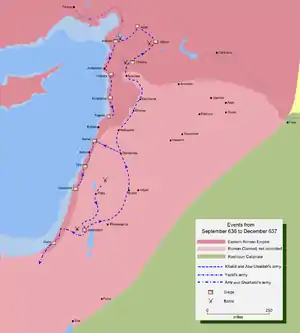637
Year 637 (DCXXXVII) was a common year starting on Wednesday (link will display the full calendar) of the Julian calendar. The denomination 637 for this year has been used since the early medieval period, when the Anno Domini calendar era became the prevalent method in Europe for naming years.
| Millennium: | 1st millennium |
|---|---|
| Centuries: | |
| Decades: | |
| Years: |
| 637 by topic |
|---|
| Leaders |
|
| Categories |
|
| Gregorian calendar | 637 DCXXXVII |
| Ab urbe condita | 1390 |
| Armenian calendar | 86 ԹՎ ՁԶ |
| Assyrian calendar | 5387 |
| Balinese saka calendar | 558–559 |
| Bengali calendar | 44 |
| Berber calendar | 1587 |
| Buddhist calendar | 1181 |
| Burmese calendar | −1 |
| Byzantine calendar | 6145–6146 |
| Chinese calendar | 丙申年 (Fire Monkey) 3333 or 3273 — to — 丁酉年 (Fire Rooster) 3334 or 3274 |
| Coptic calendar | 353–354 |
| Discordian calendar | 1803 |
| Ethiopian calendar | 629–630 |
| Hebrew calendar | 4397–4398 |
| Hindu calendars | |
| - Vikram Samvat | 693–694 |
| - Shaka Samvat | 558–559 |
| - Kali Yuga | 3737–3738 |
| Holocene calendar | 10637 |
| Iranian calendar | 15–16 |
| Islamic calendar | 15–16 |
| Japanese calendar | N/A |
| Javanese calendar | 527–528 |
| Julian calendar | 637 DCXXXVII |
| Korean calendar | 2970 |
| Minguo calendar | 1275 before ROC 民前1275年 |
| Nanakshahi calendar | −831 |
| Seleucid era | 948/949 AG |
| Thai solar calendar | 1179–1180 |
| Tibetan calendar | 阳火猴年 (male Fire-Monkey) 763 or 382 or −390 — to — 阴火鸡年 (female Fire-Rooster) 764 or 383 or −389 |

The Muslim invasion of Northern Syria
Events
Britain
- June 24 – Battle of Mag Rath: King Oswald of Northumbria sends troops to Ireland, to assist Domnall Brecc King of Dál Riata in his alliance with King Congal Cáech of Ulaid against Domnall mac Áedo High King of Ireland, during the Irish dynastic wars. Domnall Brecc, Congal and their forces are defeated near Moira. At the Mull of Kintyre (southwest Scotland), Domnall mac Áedo's fleet destroys Domnall Brecc's naval force of Dál Riata.
Persia
- March – Siege of Ctesiphon: The Rashidun army (15,000 men[1]) under Saʿd ibn Abi Waqqas occupies the Persian capital of Ctesiphon, after a two-month siege. King Yazdegerd III flees with the imperial treasure eastward into Media. Muslim forces conquer the Persian provinces as far as Khuzestan (modern Iran).
- Battle of Jalula: Muslim Arabs defeat the Persian forces (20,000 men) under Farrukhzad at the Diyala River. The cities Tikrit and Mosul are captured, completing the conquest of Mesopotamia. The region west of the Zagros Mountains is annexed by the Rashidun Caliphate.
Arabian Empire
- April – Siege of Jerusalem: The Rashidun army (20,000 men[2]), led by 'Amr ibn al-'As, conquers Jerusalem after a six-month siege. The Byzantine garrison surrenders to Caliph Umar I, who is invited by Sophronius, patriarch of Jerusalem, to pray in the Church of the Holy Sepulchre. Umar declines, fearing that accepting the invitation might endanger the church's status, and turn the Christian holy site into a mosque.[3]
- Battle of Hazir: Muslim Arab forces (17,000 men) under Khalid ibn al-Walid defeat the Byzantine army near Qinnasrin (Northern Syria). The cities of Beirut and Tyre are captured by Yazid ibn Abi Sufyan after a short siege.
- October – Siege of Aleppo: Muslim Arabs under Khalid ibn al-Walid conquer the Byzantine stronghold Aleppo; the large walled city surrenders after a four-month siege. A column of troops under Malik al-Ashtar is sent to take Azaz.
- Battle of the Iron Bridge: Rashidun forces under Khalid ibn al-Walid defeat the Byzantine army and Christian Arabs near Antioch, at the Orontes River. It marks the complete annexation of Syria into the Rashidun Caliphate.
Asia
- Chang'an, capital of the Tang Dynasty (China), becomes the largest city of the world, taking the lead from Ctesiphon, capital of Persia.[4]
- Queen Seondeok of Silla (Korea) builds an astronomical observatory near Gyeongju (Cheomseongdae), one of the oldest in East Asia.
- King Songtsän Gampo builds the first palace on the site of the Potala Palace in Lhasa (Tibet).
Religion
- The Muslims replace Zoroastrianism with Islam in Mesopotamia (later Iraq); they do not force their conquered subjects to embrace the Islamic faith, but they do require acceptance of the Quran as the doctrine of divine teaching, and will oblige their subjects to learn Arabic (approximate date).
Births
Deaths
- Andreas of Caesarea, bishop and writer (b. 563)
- Congal Cáech, high king of Dál nAraidi (Ireland)
- John Athalarichos, illegitimate son of Heraclius
- Maria al-Qibtiyya, concubine[5][6] of Muhammad
- Mo Chua, Irish bishop and founder of Balla
- Mo Chutu, Irish abbot and founder of Lismore Abbey
- Rostam Farrokhzād, Persian general (or 636)
- Wen Yanbo, chancellor of the Tang Dynasty (b. 575)
References
- Rosenthal, p. 12
- Akram 2004, p. 431
- Nicolle 2009, p. 52.
- Geography at about.com
- Exegesis (Tafsir) of Quran by ibn Kathir for Chapter 66, verses 1–5 of Quran
- Zaad al-Ma'aad, 1/103
This article is issued from Wikipedia. The text is licensed under Creative Commons - Attribution - Sharealike. Additional terms may apply for the media files.